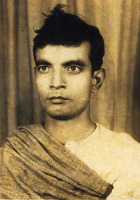Ahmed Sofa
Ahmed Sofa Biography
Ahmed Sofa (Bengali: আহমদ ছফা) was a well-known Bangladeshi poet, novelist, writer, critic, translator and intellectual. He wrote novels, poetry and non-fiction essays. He also translated the writings of others. Ahmed Sofa was renowned for his intellectual righteousness as well as his holistic approach to the understanding of social dynamics and international politics. Sofa helped establishing Bangladesh Lekhak Shibir (Bangladesh Writers' Camp) in 1970 to "organise liberal writers in order to further the cause of the progressive movement". Biography Born at Gachbaria in Chittagong district, Sofa's career as a writer began in the 1960s. He never married. On 28 July 2001, Ahmed Sofa died in a hospital in Dhaka. He was buried in Martyred Intellectuals' Graveyard. Philosophical Views Ahmed Sofa's outspoken personality and bold self-expression brought him into the limelight. At the same time, he was very affectionate towards the younger generation, who gathered around him. He was never seen hankering after fame in a trivial sense. He was a secular thinker. Published Works Sofa's fictions were often based on his personal experience. He protested social injustice and tried to portray the hopes and dreams of common people through his writing. Sofa always handled his novels with meticulous thought and planning. The trend of telling mere stories in novels never attracted him; he was innovative in both form and content. Surya Tumi Sathi (The Sun the Companion) was Sofa's first novel, written in 1964 and 1965, and published in 1967. The next novel, Onkar (The Om), which was received favorably in Bangladesh, was written in 1972 and published in 1975. In 1994, Sofa published a different type of novel, Alat Chakra (The Circle of Fire) which was actually written ten years earlier. In 1988, Sofa wrote two novels: Aali Kenan, published that year; and Maran Bilash (Luxury in Death), published in 1989. His later novels are Gaavi Bittanto (Tale of a Cow, 1994), Ardhek Nari Ardhek Ishwari (Half Man Half Woman, 1996), and Pushpa Briksha Ebong Bihanga Puran (A Tale of Flowers, Plants and Birds, 1996). Along with these eight novels, Sofa is the author of hundreds of lyrics, poems, short stories, essays, and columns. There were two long gaps in his writing career: the first was from 1973 to 1983, and the second from 1989 to 1994. Sofa’s novels are generally small in size. Even the longer ones, like Alat Chakra, Gaavi Bittanto and Surya Tumi Sathi, are only 129, 110 and 93 pages long, respectively. Comparisons In Surya Tumi Sathi the story is narrated in a third person narrative, a technique he pursued in his later novels Aali Kenan, Maran Bilash and Gaavi Bittanto. In his other novels, Onkar and Alat Chakra, he used a first person narrative technique. Except for Alat Chakra, Sofa's novels are written objectively. It is as if the author observes everything of his story—the characters and the incidents—from a distant place. Non-literary Works Sofa's essays mostly revolved around Bengali Muslims. He wrote about their history, society, and politics. He was critical of politics and culture.)

he is the greatest language scientist of Bangla